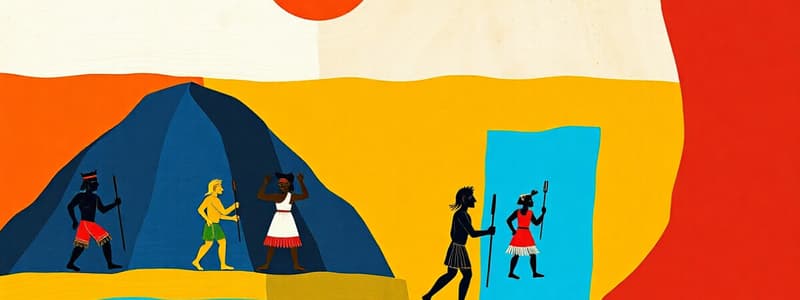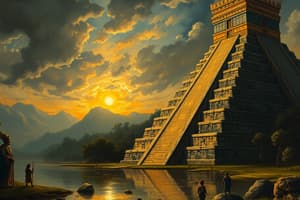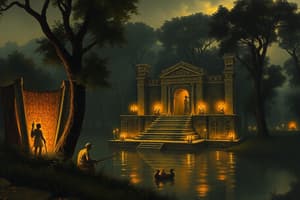Podcast
Questions and Answers
What type of agriculture did the Aztecs primarily use?
What type of agriculture did the Aztecs primarily use?
- Chinampas (correct)
- Aquaponics
- Slash and burn
- Nomadic grazing
Which of the following was a significant aspect of Aztec religion?
Which of the following was a significant aspect of Aztec religion?
- Human sacrifice (correct)
- Monotheism
- Asceticism
- Ritual fasting
What was a key feature of the social organization of the Inca civilization?
What was a key feature of the social organization of the Inca civilization?
- Democratic voting process
- Strict hierarchy (correct)
- Equal status for all
- Merchant guilds
Which language was primarily spoken by the Aztecs?
Which language was primarily spoken by the Aztecs?
What unique method of resource extraction is noted for the civilizations described?
What unique method of resource extraction is noted for the civilizations described?
Which of the following statements correctly describes the social organization of the Olmec?
Which of the following statements correctly describes the social organization of the Olmec?
What was a significant aspect of the Maya's agricultural practices?
What was a significant aspect of the Maya's agricultural practices?
Which language family was spoken by the Maya?
Which language family was spoken by the Maya?
What religious belief system did both the Olmec and Maya societies share?
What religious belief system did both the Olmec and Maya societies share?
What unique architectural feature is associated with Olmec culture?
What unique architectural feature is associated with Olmec culture?
Who is considered the most revered god in the Incan pantheon?
Who is considered the most revered god in the Incan pantheon?
Which Incan goddess is associated with the moon?
Which Incan goddess is associated with the moon?
What system did the Incas use for record keeping?
What system did the Incas use for record keeping?
What describes the social structure of the Anasazi?
What describes the social structure of the Anasazi?
Which practice was not associated with the Anasazi culture?
Which practice was not associated with the Anasazi culture?
Which of the following gods is known as the creator in Incan belief?
Which of the following gods is known as the creator in Incan belief?
What were platform mounds used for in Hohokam culture?
What were platform mounds used for in Hohokam culture?
Which type of population was predominant within the Incan societal hierarchy?
Which type of population was predominant within the Incan societal hierarchy?
What type of social organization is primarily seen in the Adena and Hopewell cultures?
What type of social organization is primarily seen in the Adena and Hopewell cultures?
Which group is known for their mythology involving multiple realms?
Which group is known for their mythology involving multiple realms?
Which of the following languages is associated with the Pueblo tribes?
Which of the following languages is associated with the Pueblo tribes?
What is a key aspect of the Iroquois religious belief system?
What is a key aspect of the Iroquois religious belief system?
What best describes the land use of the Mississippian culture?
What best describes the land use of the Mississippian culture?
Which factor contributed to social hierarchy in the Mississippian culture?
Which factor contributed to social hierarchy in the Mississippian culture?
What is a primary land use activity of the Kwakiutl tribe?
What is a primary land use activity of the Kwakiutl tribe?
Which term describes the belief system involving the Kachina in Pueblo culture?
Which term describes the belief system involving the Kachina in Pueblo culture?
What type of agriculture characterized the Iroquois society?
What type of agriculture characterized the Iroquois society?
How did leaders in the Mississippian culture gain their status?
How did leaders in the Mississippian culture gain their status?
Which group is known for elaborate burial mounds?
Which group is known for elaborate burial mounds?
What serves as a significant feature of the social structure in the Pueblo culture?
What serves as a significant feature of the social structure in the Pueblo culture?
Which language family does the Hopi language belong to?
Which language family does the Hopi language belong to?
Study Notes
Inca
- The Inca worshipped a pantheon of gods.
- Inti was the sun god, the most revered.
- Other important gods include Mama Killa (moon goddess), Illapa (thunder god), Pachamama (earth goddess), Wiracocha (creator god) and Apu Illapu (rain god).
- The social organization of the Inca empire was hierarchical with the Sapa Inca at the top.
- Below the Sapa Inca was the royal family, followed by a noble class and then the majority of the commoner population.
- The Inca used various methods to manage agriculture like irrigation, fertilization, crop rotation, drainage, storing food, and draining wetlands.
- The Inca used knotted strings called quipu for record keeping.
Hohokam
- The Hohokam lived in southern Arizona and the Phoenix Basin.
- The Hohokam built platform mounds for ceremonies.
- The Hohokam had a social structure that included elites (clans) and commoners (extended families).
- The Hohokam built irrigation canals to support their farming.
- The Hohokam cultivated a variety of Tepiman crops.
- The Hohokam also built ballcourts and reservoirs.
- The Hohokam created rock art based on relics of rituals.
Anasazi
- The Anasazi lived in the Four Corners region of the United States, including parts of Arizona, Colorado, New Mexico and Utah.
- They had a deep respect for nature and believed in a Great Spirit.
- Their social structure was relatively simple with no clear class system or rigid hierarchy.
- They were farmers, builders, and experts at land conservation.
- They did not have a written language.
Olmec
- The Olmecs lived in the Gulf coastal lowlands of present-day Mexico in the Tabasco and Veracruz states.
- Their religion was polytheistic and they worshipped many gods associated with the forces of nature.
- Their social organization was divided into a small elite class consisting of rulers and priests who held significant political and religious power, and commoners who were mostly farmers.
- The Olmec practiced agriculture as a primary economic activity.
- The Olmecs built urban centers and ballcourts, and sculpted large basalt heads.
- They spoke the Mixe-Zoquean language.
Maya
- The Maya inhabited parts of Mexico, Guatemala, Belize, Honduras, El Salvador and Nicaragua.
- Maya religion was polytheistic and played a significant role in their culture.
- Their social organization was hierarchical with a ruling class, non-noble elites, commoners and slaves.
- The Maya were skilled farmers who practiced agriculture.
- They dredged and refinished water sources to create fresh water sources.
- They extracted materials like stones for weapons and building.
- The Maya spoke the Proto-Mayan language, which was spoken over 5,000 years ago.
Aztec
- The Aztecs lived in central and southern Mexico.
- Their religion was polytheistic and syncretic in nature.
- Their social organization was divided into nobility (pipiltin), commoners and slaves.
- The Aztecs practiced agriculture, which included Chinampas, irrigation, terracing and drained fields.
- They were known for human sacrifice.
- The Aztecs developed a calendar system with a 365-day solar year and a 260-day sacred year.
- They spoke Nahuatl, the most important of the Uto-Aztecan languages.
Inca
- The Inca lived in Peru, Ecuador, Colombia, Bolivia and Argentina.
- Their religion was polytheistic.
- They had a strict hierarchy with the Sapa Inca (emperor) at the top.
- They practiced terrace farming and land art.
- They spoke Quechua, an oral language.
Adena, Hopewell and Mississippian
- The Adena, Hopewell and Mississippian societies lived in the Ohio River Valley, Kentucky, Indiana, and West Virginia.
- They built burial mounds with associated ancestral veneration practices.
- The Mississippian culture had a more defined social hierarchy with elites and commoners distinct from each other.
- The Adena and Hopewell societies had a less clear hierarchy and leaders gained status through skills and accomplishments.
- They were primarily hunter-gatherers with limited use of agriculture.
- They used symbolic imagery and art to represent spiritual beliefs.
Kwakiutl
- The Kwakiutl lived in the Pacific Northwest.
- Their mythology included a variety of realms.
- They had a social hierarchy with nobility, aristocracy, commoners and slaves.
- They practiced hunter-gatherer techniques as well as fishing and lumber work.
- They spoke the Kwakʼwala language.
Pueblo
- The Pueblo people live mainly in New Mexico, with some in Arizona and Texas.
- They believe in Kachina spirits, which are divine and ancestral spirits that interact with humans.
- They lack a strict hierarchy and leaders gain status through skills and ancestry.
- They practice farming and some hunter-gatherer activities.
- Languages vary between different Pueblo tribes.
- Eastern Pueblos primarily speak Tanoan and Keresan languages.
- Western Pueblos speak Keresan, Zuni and Hopi languages.
- Hopi language belongs to the Uto-Aztecan language family.
Iroquois
- The Iroquois lived in Upstate New York, southern Ontario, Quebec and Pennsylvania.
- Their religion was monotheistic, focused on the Great Spirit, the creator of all things.
- They have a nested social organization system based on family, clans, moieties and tribes.
- The Iroquois were farmers, hunter-gatherers and managed the forests by controlled burns.
- they spoke many variations of the Iroquois language, including Mohawk, Oneida, Cayuga, Onondaga, Seneca, Tuscarora and Cherokee.
Studying That Suits You
Use AI to generate personalized quizzes and flashcards to suit your learning preferences.
Related Documents
Description
Test your knowledge about the Inca and Hohokam civilizations. Explore their social structures, worship practices, agricultural techniques, and distinct contributions to history. This quiz covers key cultural aspects and innovations of these ancient societies.




